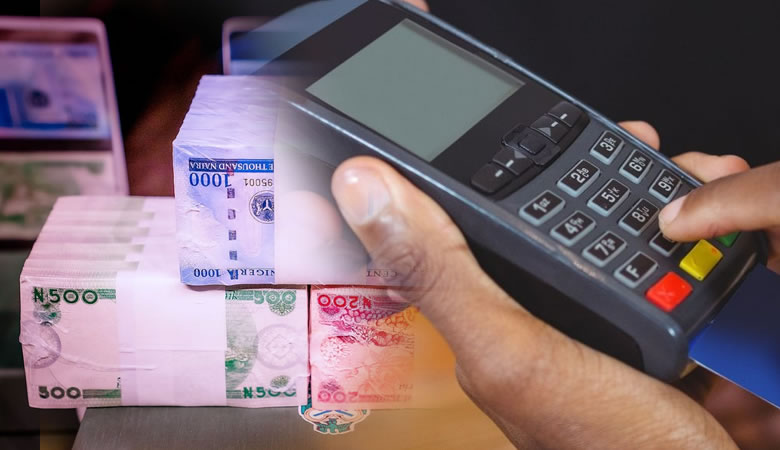
POS transactions crash by N226bn in Q1, 2024
Point-of-Sale (POS) transaction values witnessed a downturn in Nigeria for the first quarter of 2024, registering a N225.73 billion drop when compared to the corresponding quarter of the previous year.
This significant decline marks a 7.94 percent fall in the use of POS systems for transactions within the country as the currency outside banks surged.
The contrasting trends of POS transaction values and volumes—sourced from the Nigeria Inter-Bank Settlement System (NIBSS) with the data of the Central Bank of Nigeria (CBN) on currency circulation offer a complex picture of the financial habits of Nigerians in the first quarter of 2024.
While this analysis encompasses the first quarter of 2024, the CBN has not yet released the data for March 2024. This limits the analysis for cash outside banks to February 2024.
The quarter opened with a slight uptick in POS transaction values, which stood at N850.09 billion in January 2024, surpassing January 2023’s figures.
However, the initial growth was short-lived, as February 2024 saw a reduction in transaction values to N805.05 billion, down from N883.45 billion in February of the previous year. The downward trajectory extended to March 2024, where the value of transactions through POS systems further decreased to N961.86 billion from March 2023’s high of N1.15 trillion.
The total value of transactions for Q1 2024 summed up to N2.62 trillion, failing to match the N2.84 trillion recorded in the same period in 2023.
The decline in Nigeria’s POS transaction values for Q1 2024 is further mirrored by a similar fall in transaction volumes. Alongside the N225.73 billion drop in transaction value, the number of POS transactions also reduced considerably.
January 2024 saw an initial rise in transaction volumes to 112.78 million, an increase from 96.35 million in January 2023. Despite this initial rise, the overall trend for the quarter was a decline.
In February 2024, the volume of POS transactions decreased to 97.57 million from the 113.53 million recorded in the same month of the previous year. March continued this decline, with volumes falling to 103.65 million, down from the high of 177.93 million seen in March 2023.
When totaled, the first quarter of 2024 saw POS transaction volumes reach 314 million, which is a significant drop of 73.81 million, or 19.03 percent, from the 387.81 million transactions recorded in the first quarter of 2023.
This decline in POS transaction values and volumes can be seen in the context of the cash scarcity that hit Nigeria in the first quarter of 2023.
The cash shortage during that period led to a surge in cashless transactions, including the use of POS systems, as citizens sought alternatives to conduct their daily business in the absence of sufficient cash circulation.
The recent decline in POS usage suggests a reversal of the cashless trend, possibly indicating that the aftereffects of the previous year’s cash scarcity might be normalising, or that new patterns in consumer transaction behavior are emerging.
Despite the downturn in POS transaction values and volumes in Nigeria for Q1 2024, there has been an uptrend in the registration of POS terminals during the same period.
In Q1 2023, the number of registered POS terminals increased by 218,475, from 2,318,947 in January 2023 to 2,537,422 by March 2023. By the same quarter in 2024, the number of registered POS terminals had increased by 289, 154, from 3,441,287 in January 2024 to 3,730,441 by March 2024.
Overall, between the end of Q1 2023 and that of Q1 2024, Nigeria has witnessed an additional 1,193,019 POS terminals, marking a 47.02 percent increase.
This rise in terminal registration seems counterintuitive given the simultaneous decrease in transaction value and volume. It could suggest that while the immediate usage of POS systems has dropped, the infrastructure continues to expand.
Amid the decline in POS transaction values and volumes, alongside the significant rise in registered POS terminals in Nigeria for Q1 2024, the scenario is further compounded by the increasing trend of cash outside the banking system.
The CBN data show a notable preference among Nigerians to keep cash at home. In January 2024, cash outside banks escalated to N3.28 trillion, which is an increase of 314 percent from N792.18 billion in the same month of 2023. For February, the amount skyrocketed further to N3.411 trillion, marking a 305 percent increase from the N843.31 billion recorded in February 2023.
Similarly, the amount of currency in general circulation followed this upward trajectory. The CBN reported that in January 2024, the currency in circulation rose by 163 percent to N3.65 trillion, from January 2023’s N1.39 trillion. In February 2024, the amount reached N3.69 trillion which represents a 276 percent increase from February 2023’s figure of N982.1 billion.
Approximately 92 percent of all currency in circulation in February 2024 was outside the banking system. This is a notable increase from February 2023, when the figure stood at 86 percent.
The growth in the proportion of currency held outside banks is significant and suggests a deepening trend of cash retention by Nigerians, a pattern that may have influenced the observed decrease in POS transaction activities despite the expanding availability of POS terminals.
Together, these figures from NIBSS and CBN suggest a period of adjustment and a possible recalibration of trust in cash-based transactions, likely still echoing the cash scarcity challenges of the previous year.




